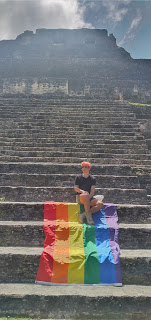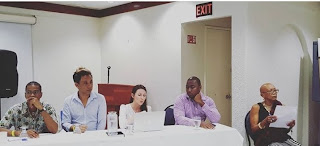Belize Action Declares War On Women and Rights in Belize
Posted 11th June, 2013
The report from Plus TV stated "Seven Pastors from the Belmopan Area Coalition of Churches met this morning with the Prime Minister and three of his cabinet Ministers regarding the Revised Gender Policy 2013." Read More at http://www.plustvbelize.com/news/more-meetings-on-gender-policy-for-the-prime-minister/ .If its a gender policy, can I ask, how many were female pastors attending again? This smells of men declaring war on women and the marginalised, when the discussion lead to the a call to withdraw the gender policy.
The interview goes on to say its is their job "to safeguard what we like to call the Constitution of God." May I add that Scott Stirm also believes in Raising of the Dead (read more here: http://www.youtube.com/watch?v=kPTjKr0KriM&feature=youtu.be) as well maintains an obsession with control of the Belizean society. The point is made clearer when one realizes that Belize Action is pushing dominionists theology. What is that?
Quoting a Jim Jones article the issue is summarized succinctly. "Patricia King appears in raising the dead video and she belongs to this ministry in the United States called Extreme Prophetic Ministries that reportedly is a part of the hardcore Seven Mountains Dominionism movement, which is also linked to the New Apostolic Reformation movement. Seven Mountains dominionism seeks to place Christians in control over the seven forces that shape and control our culture: (1) Business; (2) Government; (3) Media; (4) Arts and Entertainment; (5) Education; (6) Family; and (7) Religion. I want my readers to grasp the order of which this is placed; business first and then government. Are they attempting “shape and control” Belize? Do you see any hard core personalities in the media today affiliated with Stirm? Didn’t they recently pressure the Minister of Education in his educational materials?"
The deafening silence in the media in support of the Revised Gender Policy published by the National Women’s Commission at the end of May is both puzzling and expected. And that is sad commentary.
Puzzling because Belize is currently plagued by laws that inadequately protect boys, girls, men and women from violence and sexual assault. Puzzling because the national Public School Examination (PSE) results released this month show that 53% of the students who sat the exam failed. Puzzling because poverty is rampant, income disparity is high with 50% of women unemployed or underemployed, and 25% of men over age 14 unemployed. Puzzling because health statistics show high rates of substance abuse among men, inadequate protection from sexually transmitted diseases disproportionately effecting young women, and higher infant mortality rates for boys vs. girls. Puzzling because though women represent almost 50% of the population of the country, their political power and leadership in decision-making has been limited to 4 seats in the National Assembly since 1984.
The Revised Gender Policy addresses each of these issues and is an attempt to establish policy to eliminate the inequalities in these areas. Policy is not law. Policy is a plan designed to focus objectives of a government or group. Laws, compulsory rules and regulations which establish punishment for those who do not comply, may flow from policy or other sources. But just because something can happen doesn’t mean that it will. It could snow in Belize, but that is a ridiculous reason to skip work.
If these are serious issues facing Belize and the gender policy addresses them, why have all the dozen or so articles that have appeared in various media houses since the release of the policy focused on the opposition of the policy? Why has not one paper attempted to analyze the policy and educate the public about the contents of it and its many benefits? Why has there been no questioning of the allegations that there are punitive repercussions associated with the policy?
It appears to be because the largest opposition is coming from a group of churches. This is a tactical move, as it silences supporters. Citizens and organizations feel unable to argue with church leaders or do not wish to give the impression that they are against God or a church, so they are silent.
Some media houses have compounded the problem by referring to the groups opposed to the policy as “the church,” giving the impression that all churches in Belize are against the policy. However, like Belizean society, there is no homogeneous “church” in Belize. According to the 2010 census there are 17 different religions in Belize with Roman Catholicism representing approximately 40% of the population. The second largest grouping of the population approximately 16% has no religious affiliation.
The fate of the Sexual and Reproductive Health Policy should be a cautionary tale. Objections by some of the churches, and their review and amendments to it, resulted in a delay of approximately a decade before the policy passed.
Equal time in the media should be given to those who support the policy. Education of the intent and content of the policy should flow from the Commission which created it, as they are charged with ensuring that all Belizeans, regardless of their religious convictions are treated equally. Derailing the Gender Policy by allowing only those who speak loudest to be heard is unethical and allows a faction to rule by fear.
The report from Plus TV stated "Seven Pastors from the Belmopan Area Coalition of Churches met this morning with the Prime Minister and three of his cabinet Ministers regarding the Revised Gender Policy 2013." Read More at http://www.plustvbelize.com/news/more-meetings-on-gender-policy-for-the-prime-minister/ .If its a gender policy, can I ask, how many were female pastors attending again? This smells of men declaring war on women and the marginalised, when the discussion lead to the a call to withdraw the gender policy.
The interview goes on to say its is their job "to safeguard what we like to call the Constitution of God." May I add that Scott Stirm also believes in Raising of the Dead (read more here: http://www.youtube.com/watch?v=kPTjKr0KriM&feature=youtu.be) as well maintains an obsession with control of the Belizean society. The point is made clearer when one realizes that Belize Action is pushing dominionists theology. What is that?
Quoting a Jim Jones article the issue is summarized succinctly. "Patricia King appears in raising the dead video and she belongs to this ministry in the United States called Extreme Prophetic Ministries that reportedly is a part of the hardcore Seven Mountains Dominionism movement, which is also linked to the New Apostolic Reformation movement. Seven Mountains dominionism seeks to place Christians in control over the seven forces that shape and control our culture: (1) Business; (2) Government; (3) Media; (4) Arts and Entertainment; (5) Education; (6) Family; and (7) Religion. I want my readers to grasp the order of which this is placed; business first and then government. Are they attempting “shape and control” Belize? Do you see any hard core personalities in the media today affiliated with Stirm? Didn’t they recently pressure the Minister of Education in his educational materials?"
The deafening silence in the media in support of the Revised Gender Policy published by the National Women’s Commission at the end of May is both puzzling and expected. And that is sad commentary.
Puzzling because Belize is currently plagued by laws that inadequately protect boys, girls, men and women from violence and sexual assault. Puzzling because the national Public School Examination (PSE) results released this month show that 53% of the students who sat the exam failed. Puzzling because poverty is rampant, income disparity is high with 50% of women unemployed or underemployed, and 25% of men over age 14 unemployed. Puzzling because health statistics show high rates of substance abuse among men, inadequate protection from sexually transmitted diseases disproportionately effecting young women, and higher infant mortality rates for boys vs. girls. Puzzling because though women represent almost 50% of the population of the country, their political power and leadership in decision-making has been limited to 4 seats in the National Assembly since 1984.
The Revised Gender Policy addresses each of these issues and is an attempt to establish policy to eliminate the inequalities in these areas. Policy is not law. Policy is a plan designed to focus objectives of a government or group. Laws, compulsory rules and regulations which establish punishment for those who do not comply, may flow from policy or other sources. But just because something can happen doesn’t mean that it will. It could snow in Belize, but that is a ridiculous reason to skip work.
If these are serious issues facing Belize and the gender policy addresses them, why have all the dozen or so articles that have appeared in various media houses since the release of the policy focused on the opposition of the policy? Why has not one paper attempted to analyze the policy and educate the public about the contents of it and its many benefits? Why has there been no questioning of the allegations that there are punitive repercussions associated with the policy?
It appears to be because the largest opposition is coming from a group of churches. This is a tactical move, as it silences supporters. Citizens and organizations feel unable to argue with church leaders or do not wish to give the impression that they are against God or a church, so they are silent.
Some media houses have compounded the problem by referring to the groups opposed to the policy as “the church,” giving the impression that all churches in Belize are against the policy. However, like Belizean society, there is no homogeneous “church” in Belize. According to the 2010 census there are 17 different religions in Belize with Roman Catholicism representing approximately 40% of the population. The second largest grouping of the population approximately 16% has no religious affiliation.
The fate of the Sexual and Reproductive Health Policy should be a cautionary tale. Objections by some of the churches, and their review and amendments to it, resulted in a delay of approximately a decade before the policy passed.
Equal time in the media should be given to those who support the policy. Education of the intent and content of the policy should flow from the Commission which created it, as they are charged with ensuring that all Belizeans, regardless of their religious convictions are treated equally. Derailing the Gender Policy by allowing only those who speak loudest to be heard is unethical and allows a faction to rule by fear.




Comments
Post a Comment